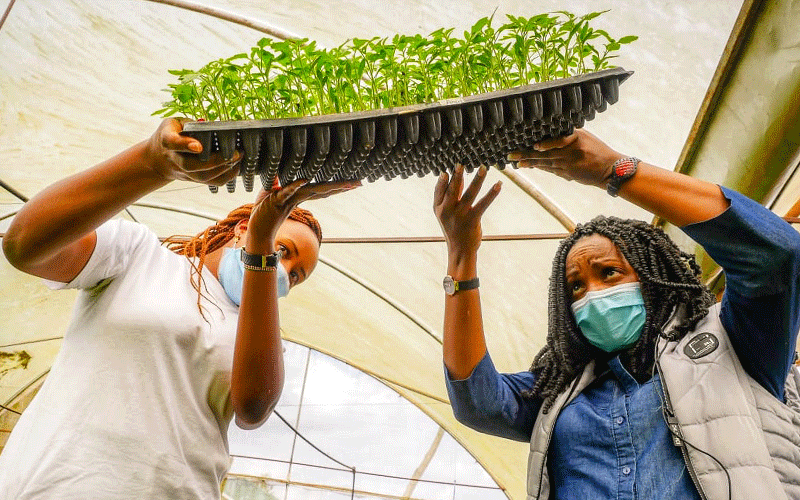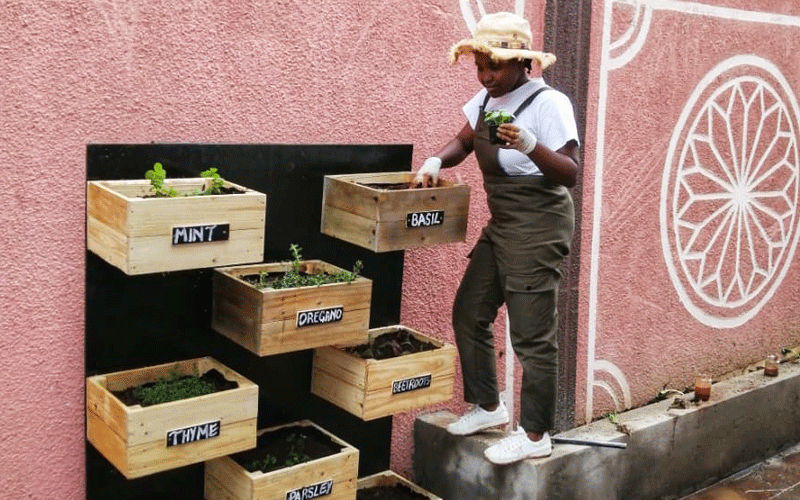Kitchen gardens bloom during Covid pandemic

Pursuit for cheap nutritious food and desire to create an extra income has pushed most urban dwellers to start growing vegetables and herbs in their backyards during the ongoing health crisis.
Harriet James @harriet86jim
The Covid-19 pandemic has left many Kenyans with extra time in their hands and also created a hunger for clean and affordable food.
This has resulted to the rise in demand for kitchen gardens as people endeavor to produce their own vegetables and herbs and to enhance the nutrition needs of their households.
The advantage of kitchen gardens is that they minimise the time spent by an individual sourcing for food supplies in conventional markets and the surplus can be sold, becoming a source of income.
To tap into this market, nutritionist Elzie Chebet begun Organic Kitchen Garden Kenya, a venture that entails designing, installing and maintaining organic kitchen gardens.
She also sells organic manure, compost, vegetables, fruits as well as herbs seeds and seedlings, kitchen gardening tools and planters.
“I was inspired by the need for people to grow their own healthy vegetables, herbs and fruits that are free from chemicals.
Kitchen gardens also saves money and ensures some form of food security, says the healthy living enthusiast.
Once a client sends their request, Elzie replies with a variety of kitchen garden options to choose from.
When the client settles on the design they would like, Elzie and her team do a site visit and determine where to install the garden depending on factors such as the direction of the sunlight.

“Client needs are different, indoor (balcony) and outdoor (backyard) spaces vary, the vegetables and herbs combinations as well as structures, which we normally tailor to client tastes, differ too.
Therefore, pricing is done after consultation with clients on a case by case basis.
Our team of experts always work with the clients to advice them on what to grow in their space depending on the type of garden,” explains Elzie
According to her, balcony gardens are normally smaller, although vegetables and herbs can be grown in that space as long as there is enough sunlight.
Vegetables with smaller leaves such as lettuces, tomatoes, baby spinach, beetroots, carrots, green onions, peppers, beans and herbs, which include dhania, parsley, rosemary, mint, basil, thyme, and oregano can be grown in balconies since they occupy less space.
Some of the challenges that she has faced while starting out include limited resources, a common challenge with many startups.
Availability of resources she says will assist her hire more staff and also work more efficiently.
She is, however, grateful that so far, she has been able to install over 100 gardens with notable influencers promoting it on their social media pages.
“People are not aware that they can grow so much in their little spaces. Sensitisation will enable us have more households growing kitchen gardens,” she adds.
Recently, the government through the ministry of agriculture launched the kitchen garden initiative to target one million households in 47 counties.
So far, there have been 15,000 beneficiaries in the Small scale Irrigation and Value Addition Project (SIVAP) and the ministry plans to further support 200,000 households across 21 counties under the National Agriculture and Rural Inclusive Growth Project (NARIGP), which has supported 19,750 beneficiaries across 21 counties.
There will be an additional 171,992 beneficiaries across 24 counties under the Kenya Climate Smart Agriculture Project (KCSAP).
“It is important to call upon communities and farmers to request their respective county governments for support to undertake this initiative of kitchen gardening.
The youth uptake of the kitchen garden initiative follows the value chain approach where they are participating from the stages of nursery establishment, seedling supply to technology advancement like the cone garden technologies.
The youths are also taking active roles in vegetables and fruits marketing,” says Annie Nyaga, Chief Administrative Secretary, Ministry of Agriculture, Cooperatives, Livestock and Fisheries.
Other projects that are giving the youth opportunities in agriculture include Rural Livelihood Adaptations to Climate Change (RLACC), which targets application of sustainable climate change technologies.
There is also the Youth in Modern Agriculture (YMAP) that targets incomes and employment for the youth through provisions of farming kits such as water, pumps, shade nets, greenhouses, chaff cutters among others.
Aquaculture Business Development Programme (ABDP), which is a project by International Fund for Agricultural Development (IFAD) is targeting 5,500 youth in aquaculture support enterprises for increased food and nutrition security in rural communities.
The ministry is also offering support to startups, which are assisting people in home gardening efforts.
They are providing visibility by calling upon them to showcase what they are doing in agricultural functions like demonstration forums, field days, ASK shows and others.
“Going forward, the ministry in collaboration with partners’ plans to map out all innovations being undertaken by youth including kitchen gardens.
The database will form as a basis of connecting the innovators with potential customers for the initiatives being carried out so that we promote the Buy Kenya Build Kenya ideals,” says Annie.















